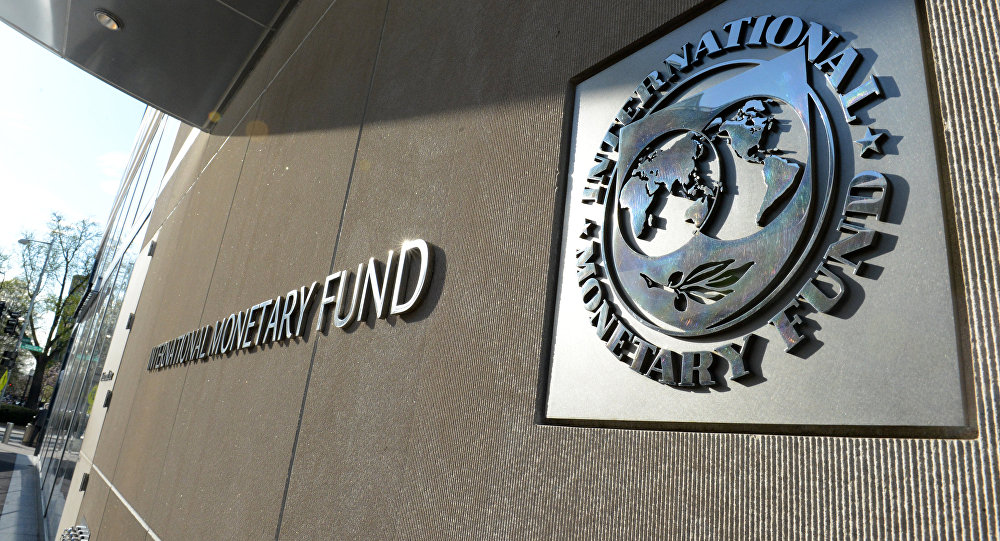- Moody’s expresses concern over Nigeria, other West African countries’ debts
The International Monetary Fund (IMF) has revised downward its 2020 Gross Domestic Product (GDP) forecast for Nigeria to two per cent, from the 2.5 per cent it had predicted earlier.
This is as on ne of the leading global rating agencies, Moody’s Investors Service, yesterday noted that government debt burdens in Nigeria and other Economic Community of West African States (ECOWAS) countries, have risen significantly.
According to IMF, the cut reflects the impact of lower international oil prices while inflation in the country is expected to pick up.
In addition, it predicted that “deteriorating terms of trade and capital outflows will weaken the country’s external position.”
The Washington-based institution stated this in its Article IV Consultation on Nigeria, which saw some of its officials visiting Lagos and Abuja between January 29-February 12, 2020, for discussions on Nigeria’s economy. The IMF team was led by the Senior Resident Representative and Mission Chief for Nigeria, Amine Mati.
The statement signed by Mati, at the end of the visit, was posted yesterday on the fund’s website.
Mati said external vulnerabilities in the country were increasing, reflecting a higher current account deficit and declining reserves that remain highly vulnerable to capital flow reversals.
The exchange rate has remained stable, helped by steady sales of foreign exchange in various windows.
“High fiscal deficits are complicating monetary policy. Weak non-oil revenue mobilisation led to further deterioration of the fiscal deficit, which was mostly financed by CBN overdrafts. The interest payments to revenue ratio remains high at about 60 per cent.
“Under current policies, the outlook is challenging. The mission’s growth forecast for 2020 was revised down to two per cent to reflect the impact of lower international oil prices. Inflation is expected to pick up, while deteriorating terms of trade and capital outflows will weaken the country’s external position,” he said.
However, Mati noted that policymakers in the country have recognised the vulnerabilities, which led to a number of initiatives that had been introduced.
“The authorities have taken a number of welcome steps. These include measures to boost revenue through the adoption of the Finance Bill and Deep Offshore Basin Act and improve budget execution by adopting the 2020 budget by end-December 2019.
“The tightening of monetary policy in January 2020 through higher cash reserve requirements to respond to looming inflationary pressures is welcome. Progress on structural reforms—particularly in Doing Business, finalising power sector reforms and strengthening governance—is commendable.
“Major policy adjustments remain necessary to contain short-term vulnerabilities, build resilience, and unlock growth potential.
“Non-oil revenue mobilisation—including through tax policy and administration improvements—remains urgent to ensure financing constraints are contained and the interest payments to revenue ratio sustainable.
“Recourse to central bank overdrafts should be limited and the mission supports the authorities’ plans to use the low domestic yield environment to front load their financing requirements,” it stated.
He stressed the need for further tightening of monetary policy by the Central Bank of Nigeria (CBN), “albeit through more conventional methods.”
This, the multilateral institution said, was needed to contain domestic and external pressures arising from large amounts of maturing CBN bills.
As part of its restrictive monetary policy stance, the CBN Monetary Policy Committee (MPC) at the end of its last meeting had raised the Cash Reserve Ratio (CRR) from 22.5 per cent to 27.5 per cent.
Mati, however, reiterated the advice on ending direct central bank interventions, securitising overdrafts to introduce longer-term government instruments to mop up excess liquidity and moving towards a more flexible exchange rate.
“Banking system vulnerabilities should continue to be addressed. The mission welcomed recent efforts to reduce legacy non-performing loans. The introduction of risk-based minimum capital requirements would also help strengthen bank resilience,” he stated.
The IMF officials also noted that structural reforms, particularly executing the much-delayed power sector recovery plan, implementing the anti-corruption and financial inclusion strategy, as well as addressing infrastructure and gender gaps, are essential to boost inclusive growth in the country.
“Nigeria’s border closure will continue to have significant economic consequences on the country’s neighbours. It is important that all involved parties quickly resolve the issues keeping the borders closed—including to stop the smuggling of banned products.
“The team held productive discussions with senior government and central bank officials. It also met with representatives of the banking system, the private sector, civil society organisations and development partners. The team wishes to thank the authorities and all those it met for the productive discussions, excellent cooperation, and warm hospitality,” the statement added.
Mati, stated that the pace of economic recovery in the country remains slow, as declining real income and weak investment continued to weigh on economic activity.
He said inflation, driven by higher food prices, has risen, marking the end of the disinflationary trend seen in 2019.
Moody’s Expresses Concern over Nigeria, Other West African Countries’ Debts
Meanwhile, one of the leading global rating agencies, Moody’s Investors Service, has noted that government debt burdens in Nigeria and other Economic Community of West African States(ECOWAS) countries, have risen significantly.
The development, according to the agency, has offset much of the debt relief from the early 2000s and raising concerns over debt sustainability.
“Debt burdens in the ECOWAS are now almost double what they were in 2010 and are unlikely to fall, raising concerns about debt sustainability, with potentially significant economic and social costs,” a Moody’s Vice President – Senior Credit Officer, Lucie Villa, stated in a report she co-authored.
The report explained that risks to debt sustainability included adverse debt dynamics, weak financeability and debt management capacity.
“These factors are particularly present in Togo (B3 stable), and to some extent, Ghana (B3 positive) and Nigeria (B2 negative).
“For some sovereigns in the region, improved institutional strength and shock-absorption capacity bolster their ability to sustain higher debt burdens compared with 10 years ago.
“For instance, the positive outlook on Ghana’s rating reflects our view that institutional improvements will help the government manage potential shocks and avoid a sharp and self-fulfilling increase in debt,” it added.
According to the report, although Nigeria’s debt levels is still low, debt dynamics in the country is becoming adverse and “fiscal metrics are deteriorating while debt management capacity remains weak.”
“Others, including Mali (B3 stable) and Niger (B3 stable) have more sustainable debt burdens under Moody’s central scenarios but they remain vulnerable to shocks that could materially increase their debt burdens and undermine their debt sustainability.
“More highly rated Senegal (Ba3 stable) and Côte d’Ivoire (Ba3 stable) have the highest external debt owed to private creditors as a share of GDP, but have the best financial management capacity,” it added.
Nigeria’s total public debt, comprising the Federal Government of Nigeria (FGN), the 36 states and Federal Capital Territory (FCT) stood at N26.215 trillion as at September 2019, according to data from the Debt Management Office (DMO). This indicated a two per cent growth when compared with the N25.701 trillion recorded as at June 30, 2019. The DMO Director General, Ms. Patience Oniha, had said the total debt stock implied that in the quarter July to September 2019, a two per cent growth was recorded, adding that the debt included promissory notes of N821.651 billion, which had been issued to settle the FGN’s arrears to oil marketers and state governments under the promissory programme, approved by the Federal Executive Council and the National Assembly.
The country’s debt profile is expected to rise further in the coming days as the federal government plans to appoint transaction advisers for a potential $3.3 billion Eurobond issue through an open competitive bid process.
The new Eurobond, the first after the 2018 issuance, would be used to partly fund the 2020 budget deficit and refinance an existing $500 million Eurobond due in January next year.
Already, the request for its approval has been sent to the National Assembly and the process is expected to be completed this quarter.
Source: THISDAY












